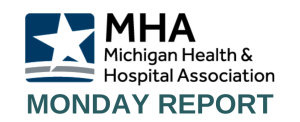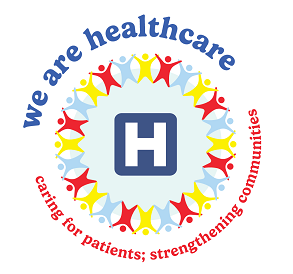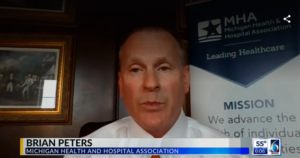
“Mankind’s greatest achievements have come about by talking, and its greatest failures by not talking. It doesn’t have to be like this. Our greatest hopes could become reality in the future. With the technology at our disposal, the possibilities are unbounded. All we need to do is make sure we keep talking.”
― Stephen Hawking
 The new year always brings two traditional speeches from lawmakers: Gov. Whitmer just recently delivered her annual State of the State address, while President Biden will share the annual State of the Union address on March 7. While the economy, housing, education, border security, climate change and other important issues are featured in these speeches, the reality is that healthcare remains a top concern for millions of Americans, and therefore will continue to be front and center for elected officials and candidates at the state and federal level throughout this election year.
The new year always brings two traditional speeches from lawmakers: Gov. Whitmer just recently delivered her annual State of the State address, while President Biden will share the annual State of the Union address on March 7. While the economy, housing, education, border security, climate change and other important issues are featured in these speeches, the reality is that healthcare remains a top concern for millions of Americans, and therefore will continue to be front and center for elected officials and candidates at the state and federal level throughout this election year.
The bottom line is that the fragility of the healthcare continuum was exposed during the pandemic and four years later, the aftershocks can still be felt. Let’s touch on just a few issues that dictate the state of healthcare in 2024:
Healthcare Workforce
Michigan hospitals employ roughly 219,000 people and are desperately trying to hire thousands more in every corner of the state. A survey we conducted last year showed there were over 27,000 job openings in Michigan hospitals. Hospitals are often the largest employer in their respective communities and serve as critical economic engines. It takes longer to deliver care when hospitals don’t have enough staff, impacting the experience of patients and families.
Much like other industries in Michigan, healthcare has a supply and demand issue, but we feel it in a uniquely acute manner: the aging population not only contributes to an exodus of talent from the field, but it increases demand for healthcare services at the same time. And because we are classic “price-takers” when it comes to a huge share of our business (i.e. Medicare and Medicaid tell us what they are going to pay), our ability to pass rising labor (and supply chain) costs along to consumers is extraordinarily limited. The financial performance of hospitals across the state and country has been negatively impacted as a direct result, and it fuels our advocacy efforts related to our ongoing viability.
Healthcare needs to continue to refill the talent pipeline and we’re making progress on these efforts. From the MI Hospital Careers campaign to the individual partnerships created between health system and secondary-education institutions, the effort is being made to increase the supply of future professionals. I’m encouraged to hear Gov. Whitmer’s proposal for tuition-free community college for all Michiganders who graduate from a Michigan high school. We have been active in advocating for such a policy to improve the number of students pursuing these pathways to address the nursing shortage.
Behavioral Health
Behavioral healthcare in Michigan continues to be in crisis. We need to fund, support and reform our systems to better meet the behavioral healthcare needs of our communities. Responding to MHA advocacy, the Michigan Legislature provided $50 million in grant funding last year to increase access to pediatric inpatient behavioral health services. We are encouraged by what our member hospitals have planned to improve access, but more needs to be done. This will be a focus area for us in Lansing through the rest of the year, specifically looking at solutions that include continuing to expand care locations, clarifying insurance coverage policies and increasing the number of providers.
Prescription Drug Affordability
Increasing prescription drug costs are a key driver of escalating healthcare costs. These increased costs are not just experienced by patients at their local pharmacies, but hospitals are also large purchasers of prescription drugs and are experiencing the same costs, threatening their viability. Data shows drug costs rose by 36.9% from 2019 to 2021 and currently account for the largest portion of healthcare insurance premiums, costing 22.2 cents for every dollar.
With these dramatic cost increases, the 340B drug pricing program has never been more important. This critical program allows safety net hospitals and other community care organizations to access certain outpatient prescription drugs at discounted prices. It does not require any state taxpayer dollars and has contributed to supporting access to care to Michigan’s most vulnerable patients for more than 30 years. We’re hopeful to see legislation passed to protect these hospitals and the benefits they provide, such as supporting OB services, financial assistance programs for low-income patients or lowering the cost of prescription drugs.
Emerging Technology and AI
Technology continues to provide many opportunities and growth for healthcare. It can serve as a “force-multiplier” that allows our staff to work smarter, extending their impact. If used correctly, technology can improve the patient experience, care delivery, worker satisfaction and more. We’re already seeing it with the dramatic growth in the utilization of telehealth and the emergence of artificial intelligence (AI) applications throughout healthcare. Technology can help expand access to care for many of our rural or disadvantaged residents who are confronted with a variety of social barriers.
We’re seeing great innovation when it comes to technology and I expect even more in the years ahead. The “disruptors,” that is to say, the large, global companies known for their technological innovation (and deep financial resources) are increasingly turning their attention toward the $4 trillion American healthcare market. These entities could be viewed as a potential threat to traditional healthcare providers, payors and others in the health ecosystem – but could also be viewed as potential collaborators and strategic partners. Without a doubt, the future delivery and financing model will be shaped in some way by this development.
At the same time, the rise of sophisticated technology and the inter-connectedness between healthcare entities, their patients and the rest of the world gives rise to the specter of cybercrime. This topic is worthy of its own special focus (stay tuned for more on that in the months ahead), but for now, let me just point to the fact that the MHA was proud to be ahead of the game in this regard, helping to launch our own healthcare-focused cybersecurity operations center right here in Michigan with MHA Endorsed Business Partner CyberForceQ.
These are just a few of the countless, complex issues that will impact Michigan healthcare in the year ahead. Plenty to be concerned about, for sure. But I remain fundamentally optimistic and hopeful about the future. Our healthcare workers are committed and resilient. And our policymakers continue to acknowledge the dependent relationship their communities have with healthcare. While I know better than to predict much of anything in an election year, I feel confident in predicting healthcare will continue to help make Michigan a better place, no matter what the political winds bring our way. All we need to do is continue our most human connection – let’s keep talking with each other and craft a positive future together.
As always, I welcome your thoughts.




















